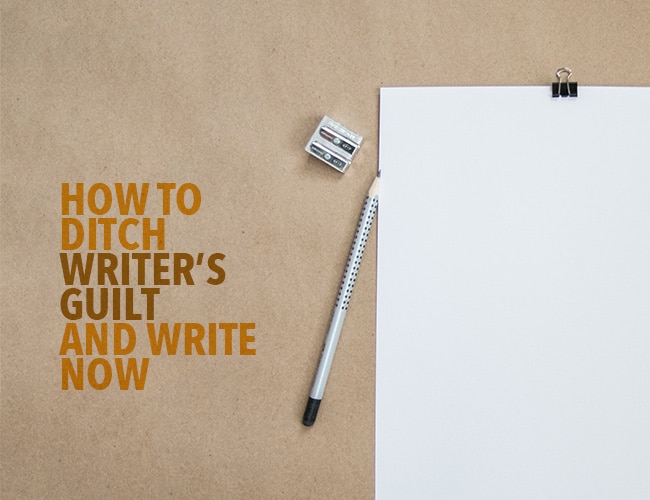Raise your hand if you’ve ever felt guilty about something related to writing. (My hand can’t get any higher.) Whether you feel that you aren’t writing enough or feel terrible about neglecting chores while finishing your novel, writer’s guilt is real. Here are a few ideas for abandoning writer’s guilt to get your work done.

If you don’t ever feel guilty about some aspect of writing, skip this article and go pound out 500 words on your current work-in-progress (maybe send one of your characters back to school with David’s post, or try genre mash-ups with the Magic Violinist).
For the rest of us, guilt seems to follow us. Some common guilt-laden messages I’ve seen and heard from writers include: I should really get off Twitter and write, I should be attending more critique groups/ conferences/workshops, I should be getting more words down per hour, I need to stop spending money on writing books. The list goes on and on.
Why do we feel so guilty when writing is something we genuinely enjoy? Why is it so easy to let guilt rob us of our process and practice?
What fuels writer’s guilt
We feel guilt when we fail to live up to expectations. Sometimes, guilt is justified, such as when we make a mistake that harms others.
For writers though, we tend to give ourselves a hard time based on unrealistic expectations and sometimes things we can’t control. We spend more time worrying about what we aren’t doing than focusing on the work in front of us.
Here are some ways I have found to abandon the guilt and get back to work.
Identify where the unmet expectations are coming from
Father Joseph Brown once asked, “Who defines the terms by which you live?” He reminds me that I have the ability to define my own terms for my circumstances today.
I can’t allow other people to dictate where I should be (“Aren’t you finished with that book yet?” or “I wrote my book in 90 days, you’ve just gotta focus”). I have to make a list of what I feel guilty about and begin to take a hard look at where those ideas came from.
My list might include frustration about the time-consuming nature of revision, the amount of time I don’t have to write, and my neglect of household chores on deadline weeks. Maybe your guilt stems from your own impatience or feeling that you aren’t writing enough (whatever that is).
Write those messages down and think about where they originated.
Evaluate the validity of those expectations
Once you have a list of expectations causing you guilt, look at each one honestly. Ask: Is this a realistic expectation? Is it within your control?
If your expectation is to get an agent this month, consider that you cannot control agents or the time it takes for them to respond. You can control how many queries you send out per week.
If your expectation is to write a thousand words every day, but you are dealing with a chronic, unpredictable illness or caring for an infant or high-need family member, you may find yourself frustrated or guilty when you can’t break away to write.
If you feel like you are neglecting your family, job, or other responsibilities, evaluate why you think so. Only you can decide what expectations are valid.
Release expectations that aren’t realistic or helpful
You can stay hungry for a goal without wallowing in writer’s guilt. Identify what you want and then break down the steps to get there. Keep your timeline as a working schedule that can be adjusted without hand-wringing.
If you are in a busy season at work or with family, adjust your expectations and take the smallest step forward in your writing each day. Release expectations you can’t control such as an agent or reader’s response to your writing.
Writers who adjust their expectations to their life circumstances aren’t giving up. On the contrary, they are likely increasing their chances of meeting their goals.
Also, quit expecting perfection from yourself (I’m speaking directly to myself on this one). Perfection is both impossible and damaging to your creative work. Any expectation or goal that isn’t aligned with your season of life and ability needs to be altered or dropped.
Take one small step toward meeting valid expectations
Now that you’ve released the expectations that you can’t control, it’s time to take a small step toward meeting those that are within your grasp.
Need to find better balance between your word count and your family time? Carve out fifteen minutes today for the one being neglected.
Maybe you recognize that you’ve spent a mint on webinars and courses without finishing them. Time to schedule a fifteen minute session with a course you already own.
Small steps forward are still progress. Say it with me: Small steps are progress! When that old familiar guilt creeps in, you can confidently banish it, knowing you are taking the steps toward what you want.
Have you struggled with writer’s guilt? What guilt-laden messages are on loop in your brain, and how do you address them so you can write? Let us know in the comments.
PRACTICE
If you've felt guilty about not writing lately, take the next fifteen minutes to write the next scene or chapter section in your book.
When you're done, share your writing in the comments below. Report back on how it felt to get those words down, even in the limited time you had. And be sure to leave feedback for your fellow writers!
Sue Weems is a writer, teacher, and traveler with an advanced degree in (mostly fictional) revenge. When she’s not rationalizing her love for parentheses (and dramatic asides), she follows a sailor around the globe with their four children, two dogs, and an impossibly tall stack of books to read. You can read more of her writing tips on her website.



0 Comments